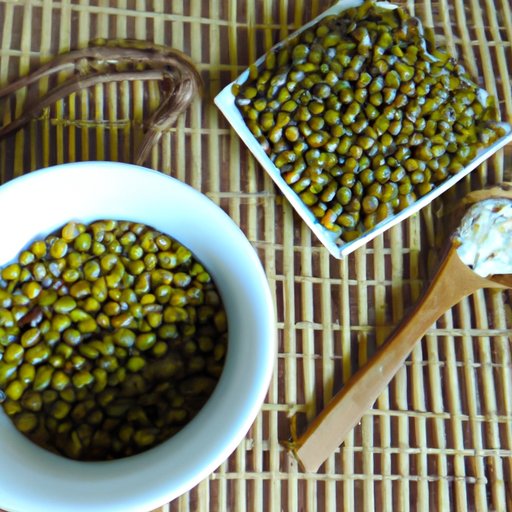Introduction
Mung beans are a type of small, green legume that is widely used in Asian cuisine. They are native to India but are now grown all over the world. In this article, we’ll explore the nutritional profile of mung beans and the potential health benefits they offer. We’ll also look at how eating mung beans can help you lose weight, their role in traditional Chinese and Ayurvedic diets, and some delicious recipes to try.

Nutritional Profile of Mung Beans and Their Health Benefits
Mung beans are high in protein, fiber, and micronutrients such as iron, magnesium, phosphorus, and potassium. One cup (192 grams) of cooked mung beans contains:
- Calories: 212
- Protein: 14.2 grams
- Fat: 0.6 grams
- Carbohydrates: 38.7 grams
- Fiber: 15.4 grams
- Vitamin A: 1% of the RDI
- Vitamin C: 6% of the RDI
- Iron: 22% of the RDI
- Magnesium: 41% of the RDI
- Phosphorus: 43% of the RDI
- Potassium: 16% of the RDI
Mung beans are an excellent source of antioxidants, which can help reduce inflammation and protect your cells from damage. The polyphenols in mung beans have been linked to reduced risk of chronic diseases, such as cancer and heart disease. They may also help protect against oxidative stress and improve cognitive function. Additionally, mung beans are a good source of plant-based protein and fiber, both of which can help keep you full for longer and reduce unhealthy cravings.

How Eating Mung Beans Can Help You Lose Weight
Eating mung beans can be a great way to lose weight. They are low in calories but high in fiber and protein, which can help you feel full and prevent unhealthy snacking. Additionally, their slow-release energy helps keep blood sugar levels stable, reducing hunger and cravings.
The high fiber content of mung beans can also aid in digestion and help you absorb fewer calories from other foods. Furthermore, mung beans contain resistant starch, a type of carbohydrate that is not broken down by the body and passes through the digestive system without being absorbed. This can help reduce calorie absorption and aid in weight loss.
The Role of Mung Beans in Chinese Dietary Culture
Mung beans have been used in traditional Chinese cuisine for centuries. They were first cultivated in China more than 5,000 years ago. Today, they are still popular in many parts of the country and are often used in soups, stir-fries, and desserts.
Mung beans are also used in some traditional Chinese medicinal practices. For example, they are believed to help regulate qi, the life energy believed to flow through the body, as well as detoxify the body and promote healthy digestion.
The Role of Mung Beans in Ayurvedic Medicine
Mung beans have also been used in traditional Indian Ayurvedic medicine for centuries. In Ayurveda, mung beans are believed to help reduce inflammation, balance hormones, and boost immunity. They are also thought to help detoxify the body and improve digestion.
Ayurvedic practitioners also recommend consuming mung beans for their cooling properties, which may help reduce pitta, one of the three doshas, or energies, in the body. In addition, they are believed to help reduce kapha, another dosha, which is associated with mucus and stagnation.

Cooking with Mung Beans: Healthy Recipes for Every Meal
Mung beans are a versatile ingredient that can be used in a variety of dishes. Here are some healthy recipes you can make with mung beans:
Breakfast Recipes
- Mung Bean Porridge: Cook mung beans in water until soft, then blend with coconut milk, honey, cinnamon, and nutmeg for a creamy porridge.
- Mung Bean Pancakes: Mix cooked mung beans with eggs, flour, and spices, then cook in a pan to make savory pancakes.
Lunch Recipes
- Mung Bean Soup: Simmer cooked mung beans with vegetables, herbs, and spices for a comforting soup.
- Mung Bean Salad: Toss cooked mung beans with fresh vegetables, herbs, and a vinaigrette for a flavorful salad.
Dinner Recipes
- Mung Bean Curry: Sauté cooked mung beans with vegetables, spices, and coconut milk for a hearty curry.
- Mung Bean Burgers: Mash cooked mung beans with breadcrumbs, herbs, and spices, then cook in a pan or bake in the oven for delicious veggie burgers.
Conclusion
Mung beans are a nutritious legume packed with vitamins, minerals, and fiber. They are low in calories and high in protein and fiber, making them a great food to include in a weight loss diet. Additionally, they have been used in traditional Chinese and Ayurvedic medicines for centuries and are believed to offer a range of health benefits. Finally, they are incredibly versatile and can be used in a variety of dishes, from breakfast to dinner.
(Note: Is this article not meeting your expectations? Do you have knowledge or insights to share? Unlock new opportunities and expand your reach by joining our authors team. Click Registration to join us and share your expertise with our readers.)
